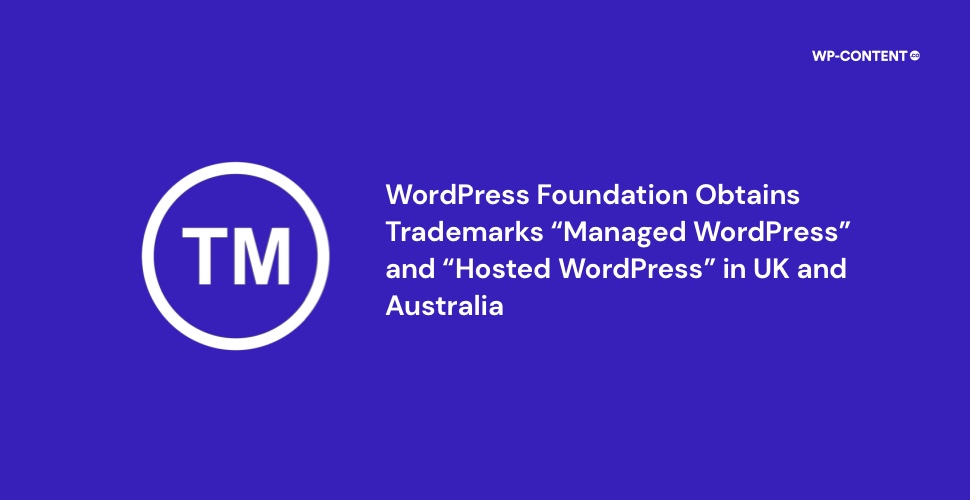The WordPress Foundation has successfully obtained trademarks for “Managed WordPress” and “Hosted WordPress” in the UK and Australia in February 2025, reinforcing its hold on these key branding terms in the industry.
The trademark process began with a filing in the United States on July 12, 2024, followed by applications in the UK and Australia in the subsequent months. More trademark applications in different regions are pending whose outcomes will be known later this year.
The approval of these trademarks could create challenges for hosting companies and other businesses that use these terms, potentially requiring them to adjust their branding and marketing strategies.
Trademark Status: Approved, Pending, and Its Impact on Hosting and Other Businesses
While the trademarks have been approved in the UK and Australia, applications in the remaining regions such as the US, Canada, New Zealand, and European Nations are still under review and awaiting final approval.
For transparency, here are the official trademark filings for Managed WordPress and Hosted WordPress across different regions. Click on the links below to view the current status of each application.
Approved Trademarks:
United Kingdom
Australia
Pending Trademarks
US
European Union
Canada
New Zealand
Currently, these trademark registrations could lead to legal challenges for hosting companies in the regions where they have been approved. Companies may need to adjust their content and branding strategy to avoid potential issues to comply with the registered trademarks.
Automattic had previously clarified how companies can use the WordPress branding without leading to any legal issues, “ For example, calling a service “WordPress Hosting” would not be nominative fair use because it makes many people think it is a hosting service offered by WordPress. By contrast, offering “Hosting for websites built on WordPress software” would not lead anyone to think the hosting service itself is offered by WordPress. Thus, calling a service “Hosting for websites built on WordPress software” would be fair use of the WordPress marks.”
The tightening of the trademarks doesn’t just affect the hosting industry but also expands to agencies as, “ The right to use the WordPress marks for commercial purposes (e.g., selling software, hosting, and agency services) is owned by Automattic. Automattic, in its sole discretion, can sublicense the WordPress marks to others who wish to use them for commercial purposes. The concept of “sole discretion” also means that Automattic can refuse to license the marks to anyone it deems inappropriate.”
This means that even agencies might also need to rework their strategy to ensure that the trademark guidelines are followed to avoid legal headaches.
The trademark enforcement has already been extended to WordCamps, as the new selection procedure, “ The new process strictly enforces WordPress trademark and GPL compliance. This has meant, for example, requiring all sponsors to stop using terms like “WordPress Hosting” and avoid unauthorized use of the WordPress logo. Companies that want to sponsor but are not in compliance with the trademark or GPL guidelines have been asked to update their websites, materials, plugins, and other codes to comply.”
In addition to this, the sponsors will have to be approved by Matt and Mary Hubbard.
WordPress Foundation Revises Trademark Policy, Omits GoDaddy
The WordPress Foundation website’s trademark policy page has undergone several revisions. We can examine the revisions with the help of the Wayback Machine
Clear mention of the recently trademarked terms
Firstly, it now has a mention of Hosted WordPress and Managed WordPress, “Other examples of terms not to use are “Hosted WordPress,” or “Managed WordPress Hosting” instead use “Hosting for WordPress.”

Previously, this section did not include this update.

WP Engine section revisions
The section referring to WP Engine has been updated. Earlier it stated “ The abbreviation “WP” is not covered by the WordPress trademarks, but please don’t use it in a way that confuses people. For example, many people think WP Engine is “WordPress Engine” and officially associated with WordPress, which it’s not. They have never once even donated to the WordPress Foundation, despite making billions of revenue on top of WordPress.”

The updated version now states, “ Please do not use “WP” in any way that confuses people. For example, many people think WP Engine is “WordPress Engine” and officially associated with WordPress, which it’s not. (They have not donated to the WordPress Foundation, despite making billions of revenue on top of WordPress!) Just because you’re using “WP” doesn’t mean you aren’t violating trademark law in other ways—if you look in Internet Archive for dozens of things WP Engine has changed on their site around their use of the WordPress (and WooCommerce) trademark you can get a good sense for what not to do.”

Emphasizing the importance of trademark enforcement
The policy page also now highlights why it is important to enforce these trademark rules, “It’s never pleasant to hear you may need to change something, but if a trademark is not enforce it is at risk of being lost, so it’s necessary and also better for consumers to understand who has official permission to use the WordPress trademark in commercial ways and who doesn’t.”

Sublicense update
The portion regarding the sublicense has also been updated as earlier it stated that Newfold had a sublicense, “ If you would like to use the WordPress trademark commercially, please contact Automattic, they have the exclusive license. Their only sub-licensee is Newfold.”

This has now been updated and Newfold having a sublicense portion has been removed, “ If you would like to use the WordPress trademark commercially, please contact Automattic, they have the exclusive license.”

Godaddy was replaced by Newfold
The next change was that GoDaddy was removed and Newfold was added in its place.
Before the revision, the trademark policy page stated as follows, “We encourage WordPress-based businesses, and hundreds of them are thriving while in compliance with this policy (Automattic, GoDaddy, Hostinger, and Bluehost are a few examples).”

The revised page states as follows, “ Please note that it is not the goal of this policy to limit commercial activity around WordPress. We encourage WordPress-based businesses, and hundreds of them are thriving while in compliance with this policy (Automattic, Newfold, Hostinger, and Bluehost are a few examples).”

While not directly about trademarks, Matt referenced Godaddy in his latest post related to security.
Earlier this year, GoDaddy donated $500K to Support WordPress Community, and Miriam Schwab, Head of WordPress at Elementor expressed gratitude for GoDaddy’s generous grant, “ Thank you @GoDaddy for expanding your contributions and support for WordPress with such a generous grant! The future of our ecosystem is strong when players step up in this way”. Matt Mullenweg responded to it,” How much have they donated to the WordPress Foundation?”

The origin of the ongoing legal drama with WP Engine and the trademark issues can be traced back to Matt’s keynote delivered at WordCamp US 2024.



